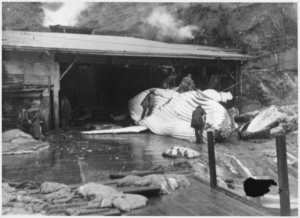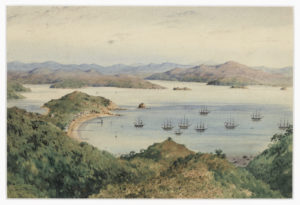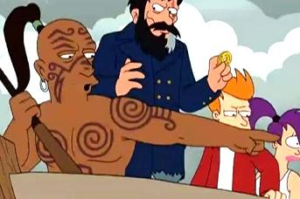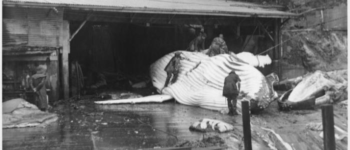1830s: Wellerman
January 16, 2021
By AHNZ
 Fascinating and wonderful that a song that fit the lives of 1830s whalers still fits for the people today. The old whaler’s song Wellerman has had a big popularity spike in January 2021. It’s a New Zealand song (c.1860-70¹) that references the Weller Brothers’ station (1831-1841) at Otakou, Otago Harbour. The name Otago itself is an Anglicisation of that earlier name, ‘Otakou’.
Fascinating and wonderful that a song that fit the lives of 1830s whalers still fits for the people today. The old whaler’s song Wellerman has had a big popularity spike in January 2021. It’s a New Zealand song (c.1860-70¹) that references the Weller Brothers’ station (1831-1841) at Otakou, Otago Harbour. The name Otago itself is an Anglicisation of that earlier name, ‘Otakou’.
“If you watch a lot of TikTok videos, you might have been caught up in the delightful recent meme of people singing old sea shanties.
The most popular appears to be ‘Wellerman’, which is a 19th century New Zealand song about whaling whose original writer isn’t known.”– Why 19th century New Zealand sea shanty ‘Wellerman’ is trending on TikTok, Newshub (2021)
“Chorus (after each verse):
(HUH!)
Soon may the Wellerman come
to bring us sugar and tea and rum.
One day, when the tonguing’ is done,
We’ll take our leave and go.” – Wellerman
 It’s a song for the Weller’s workers, of which there were very many. The settlement had, within less than 6 months, more than 80 houses. The 3 Brothers were set up by their wealthy father but were eclipsed by the legendary Johnny Jones when it came to the business of whaling and settling.
It’s a song for the Weller’s workers, of which there were very many. The settlement had, within less than 6 months, more than 80 houses. The 3 Brothers were set up by their wealthy father but were eclipsed by the legendary Johnny Jones when it came to the business of whaling and settling.
The bit about sugar, tea, and rum, is said to refer to slave labour commerce or a re-supply according to the New Bedford Whaling Museum curator. Shows what he knows. Another song of the era from up the coast a bit makes it clear that the poor workers were being paid ‘in kind’ in commodities instead of in money². As such, they were captive workers or at least it was hard for them to leave the station.
“As for the line “to bring us sugar and tea and rum,” some believe that it may refer to whaling’s part in the triangle slave trade of the Atlantic…Others believe the phrase refers to another ship coming to resupply the whalers on their long hunt.”- Michael P. Dyer, the maritime curator at the New Bedford Whaling Museum, New York Times
“I am paid in soap and sugar and rum,
For cutting in whale and boiling down tongue”- ‘Come All You Tonguers’, Thomson (1991)
So the workforce is singing about getting paid off when the work is completed so they can ship out and leave this job behind. “Soon may the Wellerman come” could refer to one of the brothers but probably it’s the company ship named ‘Joseph Weller’ (built in NZ) which provided the communications back and forth to Sydney. Or, perhaps the lyric was ‘Wellermen’ in reference to the brothers returning to Otago on the supply ship but has been corrupted to ‘Wellerman’.
From my small sample of sealing and whaling songs it seems the workers tended to dislike management, and being stranded, and looked forward to cashing in and finding a better lifestyle.
“Though they had numerous vessels in their employ, none appear to have been named the Billy o’ Tea. “- The Longest Song Wiki
The search for a ship named ‘Billy o’Tea’ is an amusing error. It’s obvious to me that it’s supposed to be an ironic joke, comparing the quality and sea-worthyness of a ship to a tea billy.
The Weller Brothers’ station was a shore station not a whale-hunter that also processed its catch on board. Weller’s men would spot a whale then hit the waves in their boats: hunt to kill then bring the whale back to land for processing. That’s what’s wrong with this song. The lyrics mention a “ship” and a “captain” along with the usual 4 whale boats (the same compliment as the Pequod in Moby-Dick, I’m sure.) The Wellermen had no need of a captain, or multiple captains just for boats did they? Each boat would have a harpooner (eg. Queequeg the Maori) and a steersman/headman³ and some rowers, no captain.
I conclude that this New Zealand song did not start its life as being about Otakou and the Wellers’ shore station. I think it was a song for ship-based whalers that was adapted with the major change being Wellerman in place of some previous lyric.
As such, the Aussies (Wellers being New South Wales based) were culturally appropriating a song from Americans or English or French: The bay whalers, in their ships. The Aussie technique was to run shore stations not, “….a ship that put to sea,” or “two weeks from shore,” etc.
“In New Zealand waters the Americans, the English and the French employed their ships in bay whaling, going ashore at intervals for supplies or sometimes to ‘try out’ (render down) blubber to make oil. Australians, on the other hand, set up shore stations. The capital cost was much less than the purchase of a whaling ship with a ‘try works on board, and whalers much preferred life ashore.”- Landmarks (1981)
Being confined to the one fishery, no wonder Otakou was tapped out within a decade. However, whaling in New Zealand did go on for many more years as I recently discovered.
—
1 Ref. Wiki
2 Wiki also backs this up, ibid
3 Ref. Whaling, Jock Phillips; Te Ara
Ref. pg12 The Oxford History of New Zealand Music, J M Thomson (1991)
Ref. Everyone’s Singing Sea Shanties (or Are They Whaling Songs?), New York Times (2021)
Ref. OTAGO’S PIONEERS CENTENARY OF ARRIVAL OCCASION WORTHY OF RECOGNITION, ODT (1931); Papers Past
Ref. p73, Landmarks, Cumberland (1981)
Ref. also The Unhistoric Story, verse 3; AHNZ
Ref. also 1874: A Fleet of American Whalers; AHNZ
Image ref. Whale factory, uncredited
image ref. Old Russell from Flagstaff Hill with fleet of American whalers in harbour; Auckland Libraries Heritage Collections
 Like Comment Share
Like Comment Share






